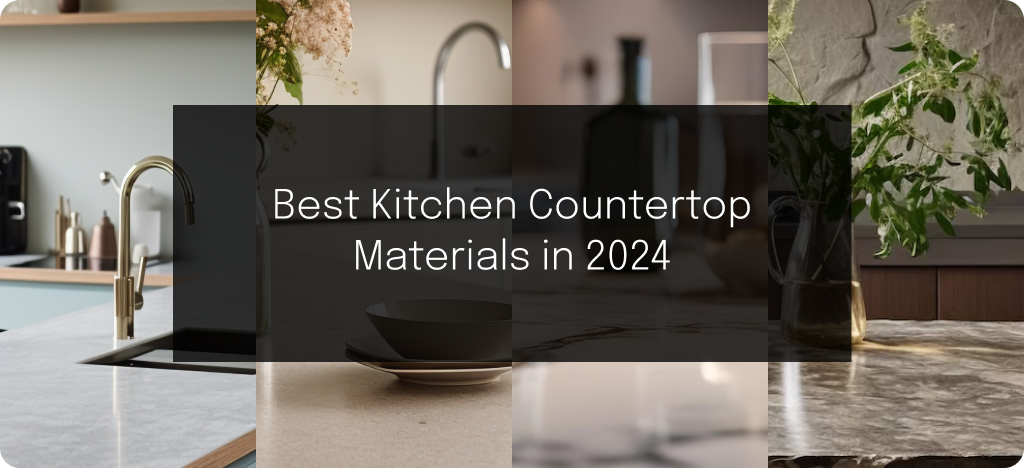Best Types of Kitchen Countertops in 2024
Countertops are key work surfaces and prominent features in your kitchen, which is why choosing the right one is so important. They need to be functional and complement the style of your kitchen.
Finding the right countertop can be challenging with so many materials available. As a significant part of your kitchen’s design, your choice of countertop can influence your kitchen’s usability and appearance. At Caesarstone, we’re recognized by many interior designers and homeowners for our quality countertops.
Here’s a straightforward guide to the best kitchen countertop materials, including tips on matching them with your kitchen’s overall design. This will help you create a space you’ll be proud to show off.
Porcelain Countertops
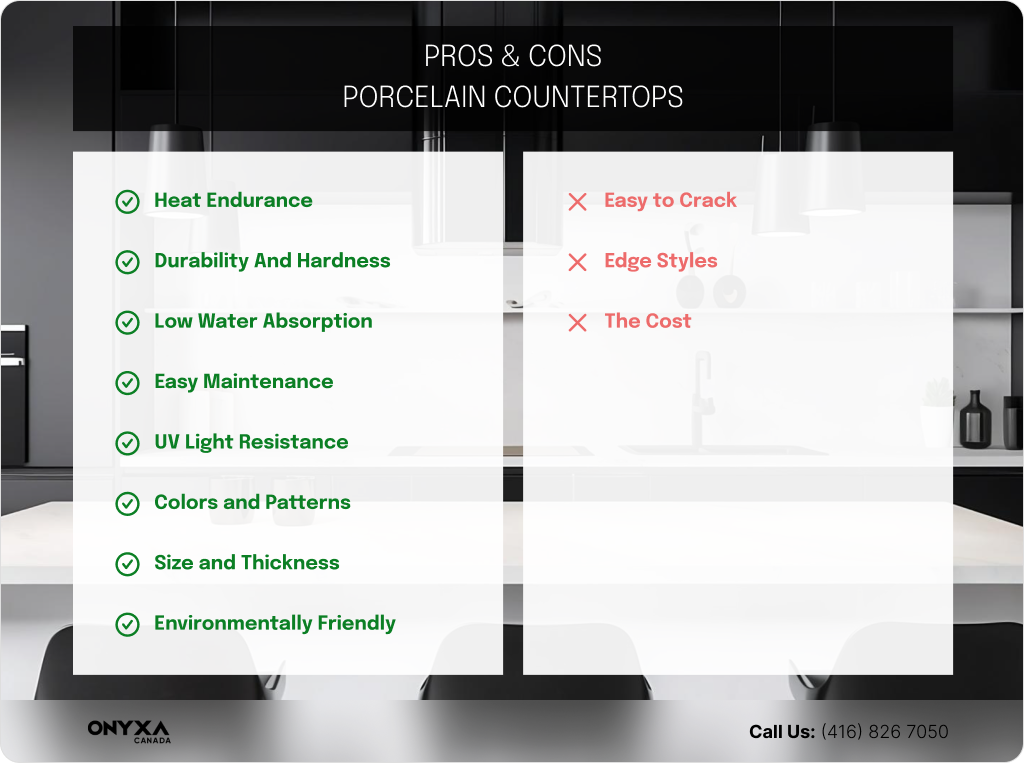
Porcelain countertops are made from fine clay that is fired at high temperatures, making them exceptionally heat-resistant. They are available in various colors and patterns, and their surface is easy to clean and maintain. Porcelain is both durable and lightweight, with a density that prevents moisture absorption, eliminating the need for regular sealing. Applying a glaze is recommended to enhance their durability and reduce their permeability. These features make porcelain a practical and attractive option for kitchen countertops.
Pros
- Heat Endurance
- Durability and Hardness
- Low Water Absorption
- Easy Maintenance
- UV Light Resistance
- Colors and Patterns
- Size and Thickness
- Environmentally Friendly
Cons
- Easy to Crack
- Edge Styles
- The Cost
Quartz Countertops
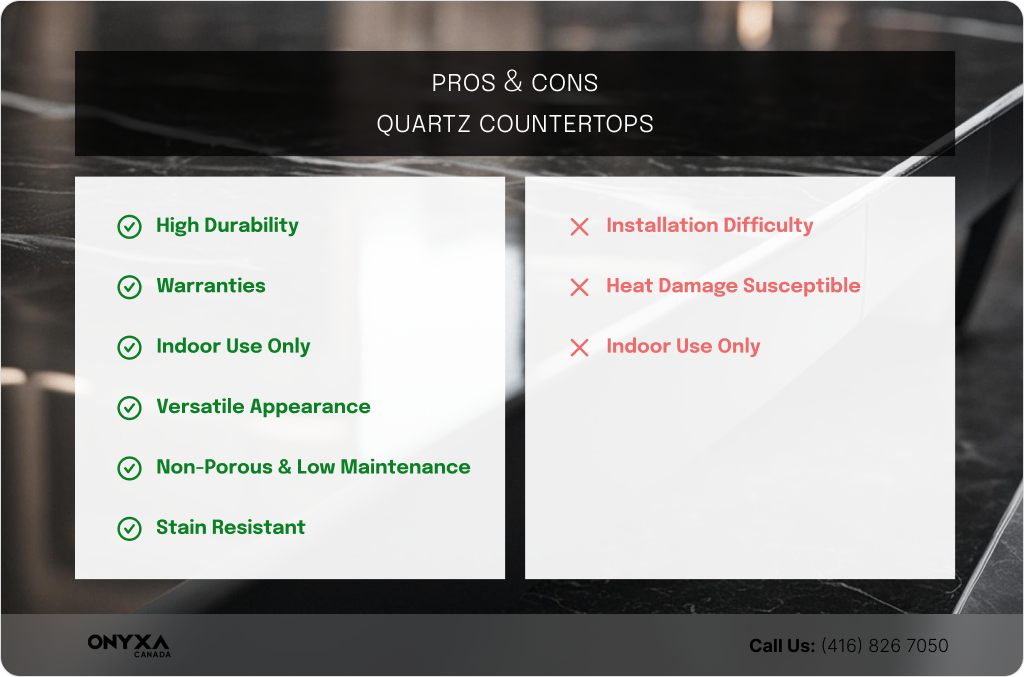
Quartz countertops are an engineered mix of natural quartz, minerals, chemical resins, and pigments. This blend, which is about 93% natural stone, showcases the clever use of human ingenuity with natural elements. Quartz has become a popular choice for countertops due to its luxury appeal and high-quality composition.
Unlike purely natural surfaces, quartz’s engineered nature allows for a range of design possibilities and functionalities. It is known for its durability and toughness, making it ideal for households that experience a lot of kitchen activity. However, while quartz countertops have many advantages, it’s also wise to consider any potential drawbacks to ensure they fit well with your lifestyle and aesthetic preferences.
Pros
- High Durability
- Warranties
- Indoor Use Only
- Versatile Appearance
- Non-Porous & Low Maintenance
- Stain Resistant
Cons
- Installation Difficulty
- Heat Damage Susceptible
- Indoor Use Only
Granite Countertops
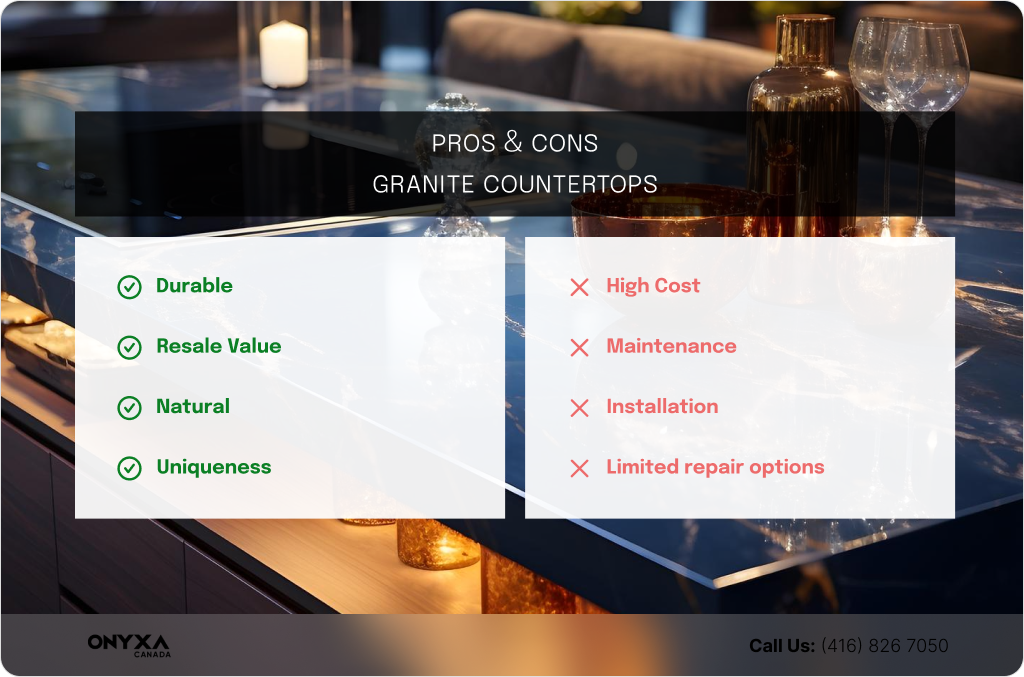
Granite countertops have been a symbol of luxury for over a century, initially gracing only the homes of the very wealthy. It took about 50 years for them to become accessible to a broader audience.
Today, granite remains popular for those seeking a touch of elegance in their kitchens. Despite their higher price tag, the timeless beauty and lasting value of granite countertops make them a worthwhile consideration for many homeowners looking to enhance their kitchen’s appeal.
Pros:
- Durable
- Resale value
- Natural
- Uniqueness
Cons:
- High Cost
- Maintenance
- Installation
- Limited repair options
Marble Countertops
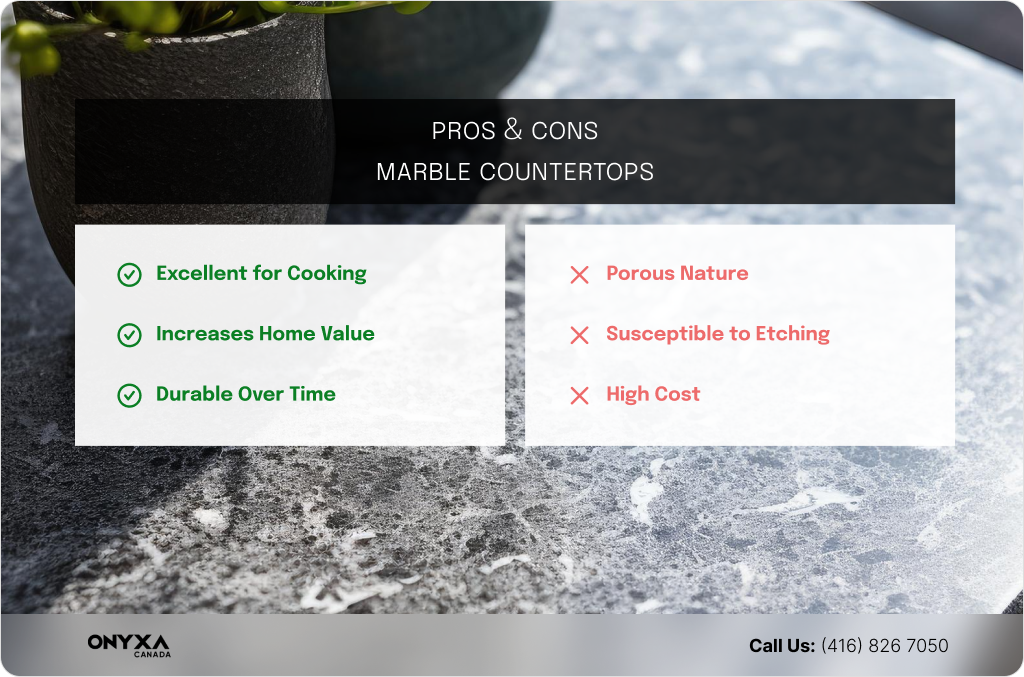
Marble countertops are renowned for their elegance, but they might not be the perfect choice for everyone. While marble has distinct advantages, it also comes with its set of challenges. Some of these pros and cons are immediately apparent, but others may only become noticeable after installation. Before you decide to install marble in your kitchen, it’s important to thoroughly understand both the benefits and potential drawbacks to ensure it aligns with your needs and lifestyle.
Pros:
- Excellent for Cooking
- Increases Home Value
- Durable Over Time
Cons:
- Porous Nature
- Susceptible to Etching
- High Cost
Quartzite
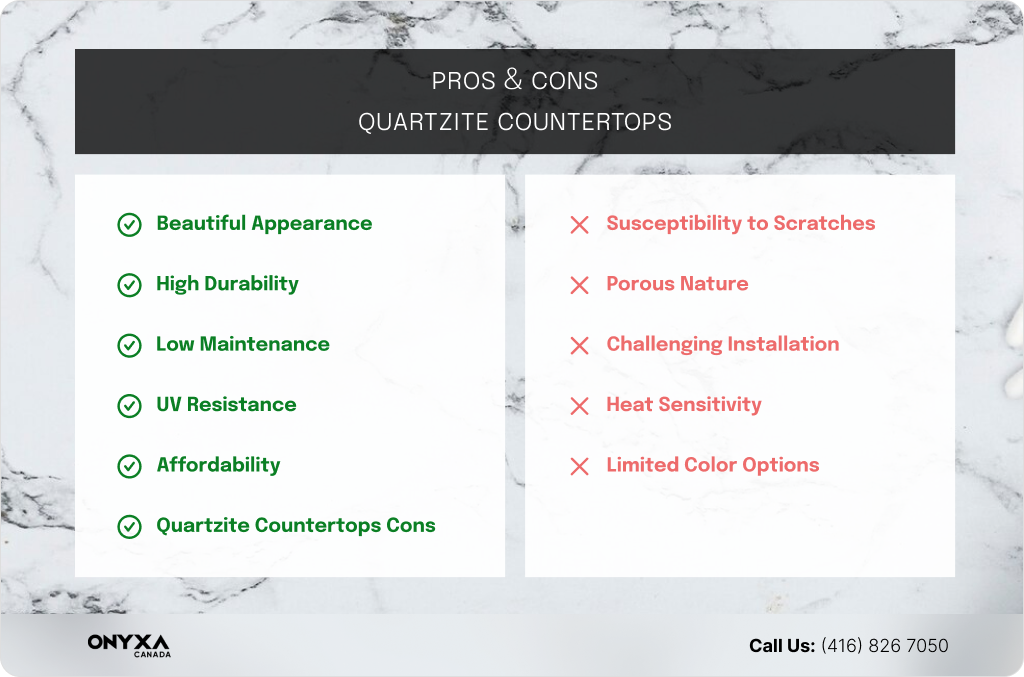
Quartzite is a standout choice for kitchen countertops and is often confused with quartz. However, unlike engineered quartz, quartzite is a natural stone formed from sandstone under intense heat and pressure.
This process recrystallizes the sandstone and binds it with silica, resulting in interlocking quartz grains that are incredibly strong. Because it can be quarried from various locations, each piece of quartzite has a unique and striking appearance.
For those seeking a durable and reasonably priced natural stone countertop, quartzite offers a superb option.
Pros
- Beautiful Appearance
- High Durability
- Low Maintenance
- UV Resistance
- Affordability
- Quartzite Countertops Cons
Cons
- Susceptibility to Scratches
- Porous Nature
- Challenging Installation
- Heat Sensitivity
- Limited Color Options
Concrete Countertops
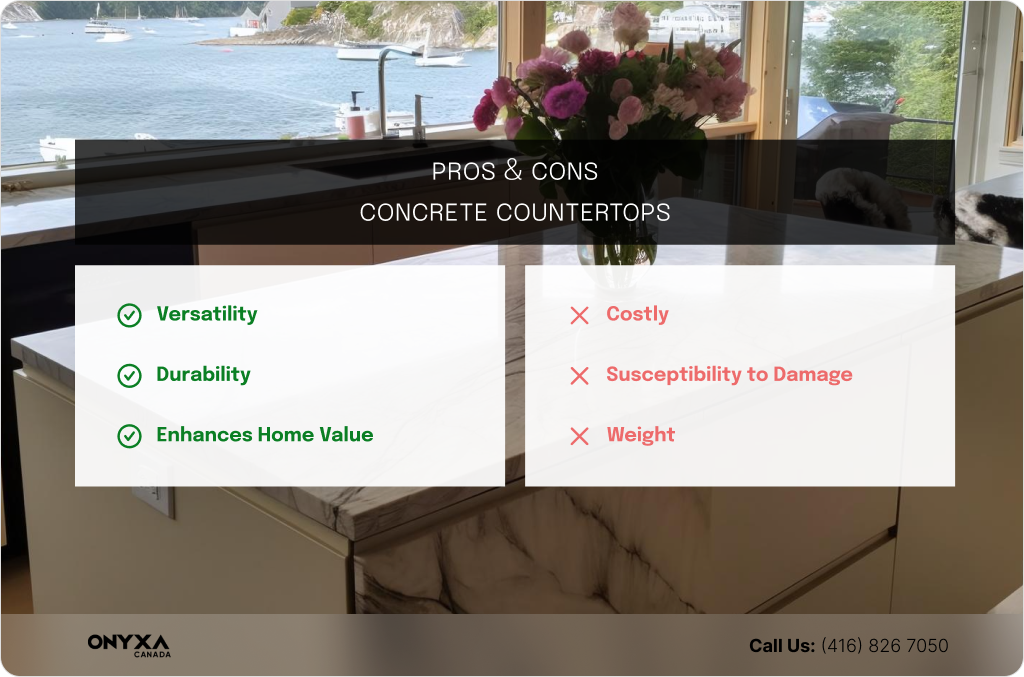
Concrete countertops have been gaining popularity but opinions on them can vary widely. Known for its versatility, concrete allows for custom looks that include different colors, textures, and the incorporation of unique elements like glass or stone. However, some might view them as merely functional with limited aesthetic appeal.
These countertops are heavier than many other materials, which can be a consideration for installation. They can be either precast or poured directly on site, typically reinforced with materials such as rebar, fiber, or wire mesh to enhance durability and strength.
Pros:
- Versatility
- Durability
- Enhances Home Value
Cons:
- Costly
- Susceptibility to Damage
- Weight
How to Choose the Best Countertop Material
Choosing the right material for kitchen countertops depends largely on personal taste, budget, and kitchen use.
The ideal countertop material should cater to all your requirements and simplify your food preparation tasks.
The countertops are a crucial component of any functional and practical kitchen and must be made from materials that satisfy various criteria.
When planning your kitchen remodel, consider these 10 key factors to determine which countertop material best suits your needs.
Durability
Durability is a crucial consideration when choosing a countertop because it makes cooking a more enjoyable experience and enhances the overall value of your kitchen and home. Countertops face daily challenges such as exposure to hot pans, spills, and scratches, making the material’s resilience a top priority.
Here’s a comparison of the durability of six popular countertop materials:
- Granite Countertops:
Granite is one of the hardest materials available. It resists scratching and chipping, but it can crack if subjected to sharp impacts. It is also heat resistant. - Quartz Countertops:
Made from natural quartz mixed with resin, these countertops are highly durable and resistant to stains and scratches. They are not as heat resistant as granite but offer better consistency in appearance. - Quartzite Countertops:
Quartzite is a natural stone like granite and shares similar properties in terms of durability. It’s resistant to heat, scratches, and chipping. - Concrete Countertops:
Concrete is very tough and can be sealed to resist scratches and stains. However, it is susceptible to cracking and may require resealing or waxing to maintain its durability. - Porcelain Countertops:
Porcelain is heat and scratch-resistant but can chip or crack upon impact. It is also lighter than natural stone options. - Marble Countertops:
Marble is less durable than granite and quartzite due to its susceptibility to staining, scratching, and etching from acidic substances.
Granite stands out as the most durable material, making it a prime choice for a kitchen that sees a lot of activity and needs to withstand the test of time and use.
Maintenance
Maintaining your countertops preserves their beauty and extends their lifespan, making maintenance another important consideration when choosing a countertop material. Here’s how the maintenance requirements compare for six popular countertop materials:
- Porcelain Countertops
Porcelain is highly resistant to staining, scratching, and heat, making it low-maintenance. It can be cleaned with water and mild detergents without the need for sealing. - Quartz Countertops
Quartz is non-porous and doesn’t require sealing, making it one of the easiest countertop materials to maintain. It can be cleaned easily with soap and water or a mild detergent. - Quartzite Countertops
Like granite, quartzite is durable but porous and needs to be sealed regularly to resist stains and bacteria. Routine cleaning involves soap and water, similar to granite.
- Granite Countertops
Granite requires periodic sealing to prevent stains, as it is porous. Regular cleaning is straightforward, usually needing only water and mild soap.
Like granite, quartzite is durable but porous and needs to be sealed regularly to resist stains and bacteria. Routine cleaning involves soap and water, similar to granite. - Concrete Countertops
Concrete must be sealed regularly to resist stains and water damage. It can also require waxing to maintain its finish. Daily maintenance is straightforward, but you must be diligent to avoid stains setting in. - Marble Countertops
Marble is high-maintenance due to its porosity and susceptibility to etching from acidic substances. It requires frequent sealing and careful cleaning to prevent stains and etches.
Quartz and porcelain top the list for ease of maintenance. They offer hassle-free upkeep without the need for sealing, making them excellent choices for busy kitchens.
Cost
The cost of countertops varies significantly based on the material, installation requirements, and the stone’s rarity. Here’s an overview of how the costs compare for six popular countertop materials:
- Porcelain Countertops
Porcelain is generally more affordable than natural stone options but can vary depending on the installation’s quality and complexity. - Concrete Countertops
The cost for concrete countertops can vary widely, often based on the custom work involved. Concrete tends to be mid-range but can escalate with complex designs and finishes. - Granite Countertops
The cost of granite countertops can vary widely, depending on the color, rarity, and geographic location of the stone. Generally, prices range from moderate to high. - Quartz Countertops
Quartz is generally price-consistent and typically in the mid to high range. The cost reflects its durability and the engineering process needed to create the slabs. - Quartzite Countertops
Quartzite can cost similarly to high-end granite and quartz, particularly for more sought-after varieties. It combines natural beauty with impressive durability. - Marble Countertops
Marble tends to be at the higher end of the cost spectrum, especially for high-grade varieties and rare colors. It’s priced for its aesthetic qualities and uniqueness.
Marble and quartzite often lead in terms of cost due to their natural rarity and the mining difficulty involved, while porcelain offers a more budget-friendly alternative with a lot of the aesthetic and functional benefits of more expensive material
Aesthetics
When it comes to the aesthetics of kitchen countertops, the visual appeal can dramatically affect the overall look and feel of your kitchen. Each material offers unique characteristics, making the choice a matter of personal taste and the style you want to achieve. Here’s a look at the aesthetic qualities of six popular countertop materials:
- Porcelain Countertops
Porcelain comes in various colors and patterns, including designs resembling marble, wood, and metal. Due to its versatility in mimicking other materials, it’s a great choice for achieving a specific look.
- Marble Countertops
Marble is synonymous with luxury, featuring soft veining and a glossy finish that stands out in any kitchen. It offers classic beauty that is perfect for creating a statement of elegance. - Granite Countertops
Known for its rich, natural beauty, granite offers a depth of color with unique grain patterns that vary from slab to slab, ensuring no two countertops are exactly alike. Its natural look is highly prized for adding an elegant and upscale touch. - Quartz Countertops
Quartz provides a more uniform appearance than natural stone and is available in various colors and patterns, including options that mimic other materials like marble. It’s a versatile choice that fits well in many different kitchen styles. - Quartzite Countertops
Quartzite has a similar aesthetic to marble but often with more durability. It features beautiful veining and a crystalline sparkle not seen in other stones, giving it a distinct and refined look. - Concrete Countertops
Concrete is highly customizable and can be textured in a range of ways, from polished to pressed or troweled. It can also be tinted in various colors or embedded with glass for a unique, artisanal appearance.
Choosing the right material depends on the desired effect in your kitchen. Whether you’re looking for the classic elegance of marble, the unique natural beauty of granite, or the customizable options of concrete, each material offers its own aesthetic strengths.
Heat Resistance
Heat resistance is critical for kitchen countertops, especially if you frequently cook and handle hot pots and pans. Here’s how six popular countertop materials stack up in terms of their ability to withstand heat:
- Granite Countertops
Granite is highly heat-resistant, making it a top choice for kitchens where hot cookware is often placed directly on the surface without fear of damage. - Quartzite Countertops
Quartzite, being a natural stone, also offers excellent heat resistance, similar to granite, and can handle hot items without damage as long as the heat is not excessively prolonged.
Porcelain Countertops
Porcelain resists heat well due to its firing at high temperatures during manufacturing. It can typically handle hot pots and pans without being damaged. - Concrete Countertops
Concrete can generally withstand high temperatures, but prolonged exposure to heat can cause damage and may compromise the sealer applied to the surface. - Quartz Countertops
While quartz is durable in many ways, it is less heat resistant than granite or quartzite. Prolonged exposure to high temperatures can cause discoloration or cracking, so it’s advisable to use trivets and hot pads. - Marble Countertops
Marble has moderate heat resistance but can be susceptible to damage from high temperatures, which may cause cracks or discoloration. Like quartz, it’s best to avoid placing hot items directly on marble.
Granite and quartzite are the standout choices for those who need countertops that can handle heat without any worry. Porcelain also offers robust heat resistance, making these materials ideal for active kitchens.
Stain Resistance
Stain resistance is critical for countertops, especially in high-traffic kitchens where spills are common. Here’s how six popular countertop materials fare in terms of resisting stains:
- Porcelain Countertops
Porcelain is also non-porous, which makes it extremely resistant to staining. This material can handle most spills, from wine and coffee to oil and acidic substances. - Quartz Countertops
Quartz is highly stain-resistant due to its non-porous nature. It doesn’t absorb liquids, making it easy to wipe off spills without leaving stains. - Granite Countertops
While granite is less porous than marble, it can still absorb liquids if not sealed properly. It requires periodic sealing to maintain its stain resistance. - Quartzite Countertops
Quartzite, a natural stone, is porous and susceptible to staining if not regularly sealed. Once properly sealed, it offers good resistance to common kitchen spills. - Concrete Countertops
Concrete is inherently porous and must be sealed to prevent stains. Even with sealing, the effectiveness can diminish over time, requiring resealing to maintain stain resistance. - Marble Countertops
Marble is the least stain-resistant material on this list due to its porosity and sensitivity to acidic substances, which can etch the surface and leave marks even if the spill is addressed quickly.
Quartz and porcelain are the top performers for stain resistance, making them ideal choices for busy kitchens where spills are frequent. These materials allow for easier cleanup and less worry about permanent damage from everyday mishaps.
Scratch Resistance
Scratch resistance is an essential factor to consider for kitchen countertops, especially in environments where cooking and food preparation occur frequently. Here’s a look at how six popular countertop materials stand up to scratches:
- Porcelain Countertops
Porcelain is extremely resistant to scratches. Its glazed surface helps protect against most kitchen mishaps. - Granite Countertops
Granite is highly resistant to scratches due to its hardness. It can withstand most kitchen utensils without showing wear, though cutting directly on it is not recommended as it can dull knives. - Quartz Countertops
Engineered from natural quartz and resin, quartz countertops are also very resistant to scratching. The resin binder makes the surface tough against most everyday challenges. - Quartzite Countertops
Quartzite, being a natural stone like granite, is very resistant to scratches. It is comparable to granite in terms of its ability to withstand scratching. - Concrete Countertops
While concrete is generally durable, it’s not as resistant to scratching as quartz or granite. It can show marks if heavy or sharp objects are dragged across it. - Marble Countertops
Marble is the least scratch-resistant of these materials. Its softer nature makes it prone to scratches and chips more easily than the others listed here.
For kitchens that experience a lot of use, quartz, granite, and quartzite are the top choices for scratch resistance. These materials will maintain their finish even under frequent use, whereas marble may require more careful handling to avoid surface damage.
Conclusion
As you can see, although almost all the discussed materials have a relative quality in the studied characteristics, as to conclusion, it can be clearly seen that Porcelain Slab or Porcelain Countertop check a lot of boxes and has the most advantages, followed by Quartz and Granite Stone. Of course, we will continue our comparisons in other features and categories in the following articles, to achieve a comprehensive unbiased outlook. But for now, we can say that the porcelain countertop is the best in terms of materials’ inherent quality because it has the best Hardness & durability, Non-Porous Surface, Heat Resistance, and UV Resistance. And although it is not the best in terms of relative Thickness & weight, still gets better points than quartz and granite.
